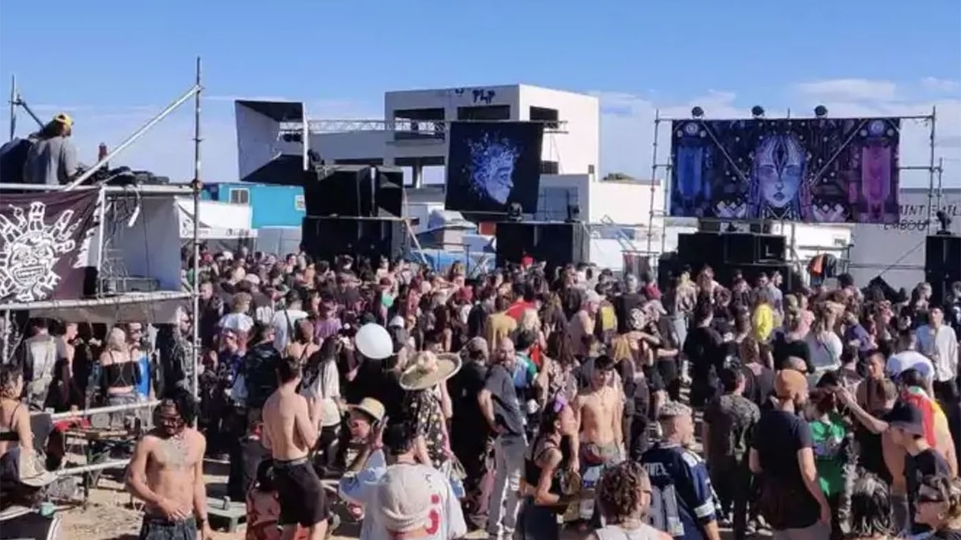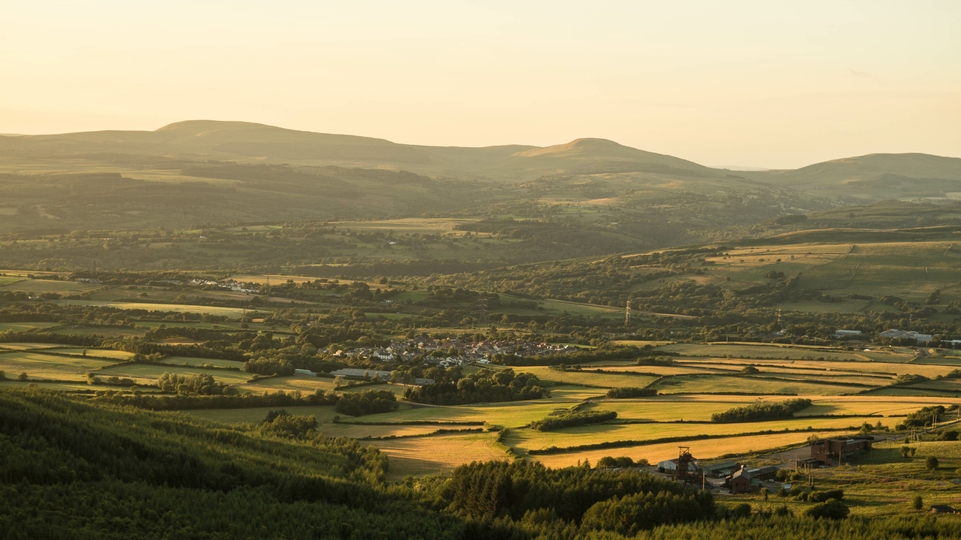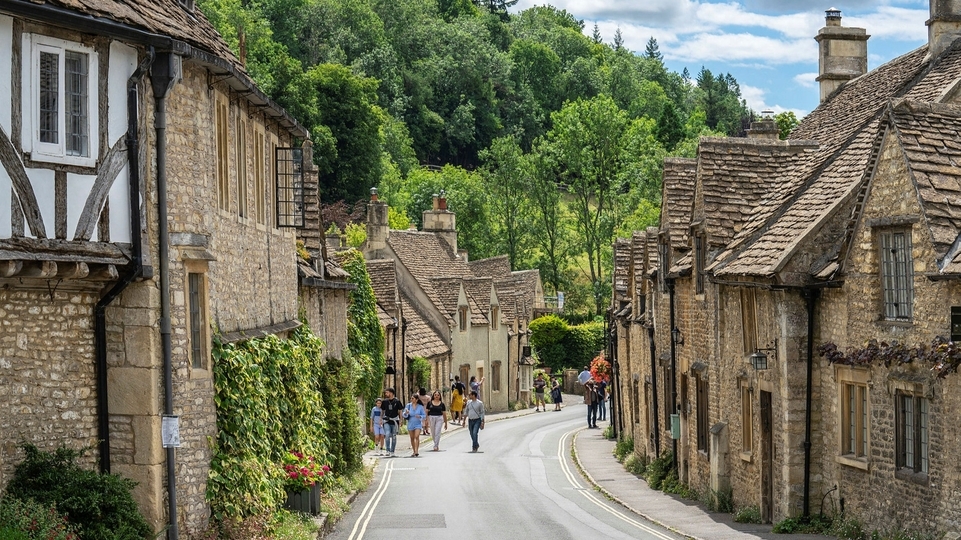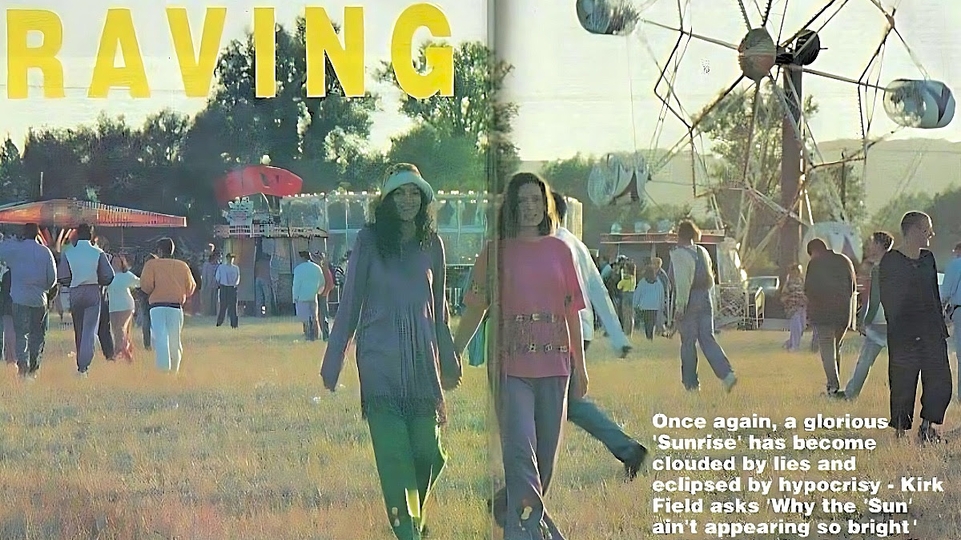
Inside the UK’s thriving free party scene
Though arguably most prominent in the ’90s, free parties and illegal raves have never gone away. Despite the increased surveillance from authorities, passionate DJs and sound systems continue to throw events in a similar way that they always have, looking to create a sense of community and an alternative to the commodified dance mainstream. Dave Jenkins heads to a free party, and speaks to some of the illegal rave scene’s advocates about why they keep the fire burning
The quest is timeless. Swapping clues with randoms at services. The heartless pulse of the party-line’s engaged tone. The convoys, intrigue, suspense, rumours. The commitment to a journey into the unknown even though you might not end up at a decent party at the end of it... and every spicy morsel of anxiety, thrill, fear, worry and excitement in between.
2.30am: DJ Mag is feeling all of these emotions as we pull off the road, somewhere in the middle of north Cornish nowhere. A row of flashing blue police lights and a convoy of cars heading back towards us tell us everything we need to know: the free party has been rumbled. We ring the party-line again. “Party people!” exclaims the burly south-west accent. We’ve heard him so many times he feels like family. “We are sorry, but the location has moved. Please head to the Wiltshire area and we’ll update as soon as we can. This party will happen!”
It’s the third region we’ve been directed to tonight, and layby gossip is popping off: some say we’re heading to Salisbury, others say Glastonbury. One character declares the line to be compromised and that we’re being led into a trap. A couple suggest everyone goes back to theirs for a sesh, because the chances of actually getting to any type of party are diminishing by the minute.
We head back towards the M5, working out our next move. Having attended many free parties over the years at different points since the late ’90s, it’s a familiar sensation. Not even the voracious evolution of technology can significantly date the experience. Rural areas have such notoriously poor mobile reception that this could literally be any point since the dawn of ravekind. (Haircuts, fashion, map technology, car types and poisonous house price inflation notwithstanding.)

“That’s the ethos of a free party, the fact there are no rules and you can do what you want. That will never change. It doesn’t matter what generation comes along and takes responsibility for it, as long as they’re into it for the same reasons.” — Kelvin 373
However the same cannot be said for the police. Technology has definitely given them a fresh edge in this cat-and-mouse game. The internet, social media, and message apps have opened up all kinds of leaks in an otherwise tightly kept need-to-know community, especially in WhatsApp and Telegram groups. If they get there early enough, they can shut down the event and even go as far as confiscating sound systems. Such is the case on this particular Saturday night, as hundreds of ravers from across the UK attempt to descend upon Davidstow Airfield for this year’s annual Easter teknival — Eggtek. The first big UK multi-rig gathering of the year.
“Every bank holiday weekend. That’s been the way since I started,” says East Anglia-based d&b DJ Mowgli, who’s been attending free parties for the last 10 years. “I tend to go to those because they’re worth it. No disrespect to smaller crews with smaller rigs who do random things in the middle of the month, but the bigger ones have a lot more going on. Less likely to get stopped by the police.”
Strength in numbers; if enough people arrive on site, the rigs are up and people are raving before the police arrive, then it’s a lot harder to stop the party. “It was very different years ago. You could set up weeks before and get away with it. Now we’re lucky if we get 12 hours before the police come in,” offers one particular sound system owner we speak to in the run up to Eggtek.
Like a few people we speak to for this article, he’s asked to remain anonymous. Others straight up declined. Unlike many aspects of mainstream electronic music, no one gets into rig ownership for bragging rights or empty ‘superstar’ clout. Certainly not with the £10,000 fine that’s been in place since the summer of 2020 during the pandemic. It’s a high price for a party, no matter how strongly you feel about challenging the ever-oppressive capitalist conditions and trying to create an alternative, inclusive, social model that prioritises people over profit, trust over fear, and collaboration over competition.
“This will never stop though. There’s always been an interest in this side of things. People will always find a way of getting together and dancing. Just completely free.”

In fact in a recent documentary, film maker Aaron Trinder explains how humans have been gathering to dance and create some semblance of societal progress, change and unity for centuries. A compelling watch, Free Party: A Folk History draws parallels between the free party movement of the early ’90s and early socialist groups such as the Diggers and the Levellers of the mid-1600s.
“They were early movements where there was a very clear reaction to the powers that be,” explains Aaron, whose documentary focuses in on a very particular moment in time when urban ravers linked with the rural and nomadic new age traveller community. “Both of them said, in their own way, ‘We’re not doing things like this anymore, how about we use this land for all of us?’ These types of examples and stories definitely inspired the new age traveller movement.”
Linking free party culture back to the free festival movement of the ’80s and the counter culture hippie movements of the ’60s, Aaron also comments on the significance and tradition of public holidays. “The traveller festivals adopted the pre-Christian festivals that were always there before,” he explains. “Beltane, the equinoxes, midsummer, midwinter. People in the country knew these well because there would always be a gathering in a common space where a party would be held, people would stop working, there would be intoxication and it would be fun. It was done for the people, by the people. It’s no surprise at all that the big free party events tend to happen during these weekends. They’ve been staples in the calendar for hundreds and hundreds of years.”
This deep history and tradition helps us understand the allure and compulsion to unite and dance, and why it won’t ever stop, despite tighter and tighter measures and legislations by the authorities.
4.30am: meanwhile, back in the present, a petrol station conversation leads to a new party location. After driving for over six hours, we stop on a single track road. A truck carrying a rig gets stuck in the mud and everyone runs over to hold it steady and push. Further up the track, another van (also carrying a rig) has the same situation. This time a car is trying to tow it. It’s futile; a little further on, things turn into a clump of abandoned automobiles. It sprawls into a crossroads and over into a forestry carpark, where more rigs are setting up beyond.
This chaos takes a good hour to negotiate, and while there’s palpable relief that we’ve arrived somewhere and the night isn’t going to be a wash-out after all, the air also has a note of agitation and pent-up energy. Everyone’s journeyed for well over the combined length of the Lord Of The Rings trilogy, and they look like it, too. There’s shouting, arguing, confusion and a lot of ‘making up for lost time’ wavery as balloons, bottles and bumps seem to flow the second everyone falls out of their car. It takes a certain type of person to go the lengths a free party requires you to go to. And while not every mission is quite as epic as this particular night’s, there are always navigational twists and turns en route.

“Free parties changed my perspective on the world. They made me realise what people can achieve. We were a bunch of kids with nothing. The community that grew through our parties guided me through life.” — Stivs
For many, the puzzle and the quest are a big part of the appeal. This gung-ho sense of missioneering elevates the party to an adventure and promotes your role from consumer to participant, which is a refreshing experience at a time when dance culture is becoming increasingly homogenised and exploited by corporate marketing and alignment. As everything is packaged in such convenient, digestible, and very play-safe ways, and line-ups and attractions are all honed down tightly by a strict algorithm, and we know exactly what we’re going to get, a free party is an invigorating tonic, and provides an essential alternative that reminds us what’s at the heart of a genuine, meaningful gathering: community.
“Free parties changed my perspective on the world. They made me realise what people can achieve,” says Stivs. A DJ, artist and original member of the Born On Road label, Stivs cut his teeth at free parties as part of the Life4Land crew, an integral outfit in the movement during the ’90s and 2000s. “We were a bunch of kids with nothing. The community that grew through our parties guided me through life. I’ve travelled through Europe with that community. Everywhere I went, if I could find the free party lot, I was sorted.”
Stivs is proudly part of a generation who now have a major influence in the wider world of dance music and have come from free parties. Festivals such as Balter and Boomtown have developed from free parties, while artists like Mandidextrous, Inja and the almost entire roster of Born On Road have got incredibly deep roots in free party culture. Especially Stivs’ old friend and erstwhile label co-owner, Kelvin 373, who literally was born on road, as his mother was part of a crew called Tribal Dance in the ’90s. Inspiringly, Kelvin’s daughter Kaisha is now involved in the culture too. With the WickeDnBad crew, Kaisha is part of a whole new wave that carries an old school ethic with a contemporary approach.
“The big thing for us is to bring together the free party ethos and vibe, but in a legit way,” she explains. “Because of things like TikTok and Instagram, d&b and raves have become massive. But I feel people getting into it are doing it because they want to get munted. They don’t really care about the music. We want to bring back the real love for the party and that proper sense of community back into the club.”

Here’s where things get a little less timeless. Many modern collectives and sound systems run completely legitimate operations as labels, club promoters, audio technicians and sound systems for hire. In the case of WickeDnBad — which Kaisha runs with other DJs Jack and Ned, who’ve also grown up around sound systems and free party culture — everything they run is above-board, but it wouldn’t be a surprise to see them as individuals, or some of the rigs they’re associated with (Sensi and Sound Of Rebellion), present at a free party. “Loads of crews are putting on their own nights,” Kaisha continues. “It’s a good place to start. From small illegals, you can build a community and move into legal venues with a crowd and less risk.”
This type of approach to club events is an exciting model for the future. Rather than rely on the traditional model of booking big headliners (and lining agents’ pockets in the process) the idea for these type of events is to focus purely on community and not have to rely on the usual commercial club tactics. “Events are struggling, venues are closing, ticket prices are going up. It’s becoming so much harder,” says Alfie, a co-founder of Bristol-based organisation The Stomp Project. Like WickeDnBad, Stomp Project is entirely legit, but the inspiration and ethics come from free party culture. “Everything has gone up in price. Suddenly that £10-15 you had for your weekend ticket is much more of a risk. I think a lot of people are trying to figure out alternative ways of doing this. To be honest, it’s tricky to see how the legal side of it all can keep going!”
The Stomp Project contribute a percentage of their takings to local charities and have also committed to local outreach projects within Bristol. Alfie puts that influence entirely down to his experiences at free parties, and it’s a sentiment that echoes through the younger people DJ Mag spoke for this article. Mowgli, for example, is now a firm fixture at festivals. He puts a lot of that down to his exposure at free parties.
“All of my success and any type of following I’ve got, or any bookings I’ve had, come from free parties. I wish more people could have experienced what I’ve experienced,” he smiles. “I first went because I was too young to get into clubs, but then I was totally hooked by the sense of community I felt. People were looking out for each other and they’re just doing something for the absolute love of it and nothing but the buzz of bringing people together. That’s inspiring!”
Mowgli now co-runs a label and promotions outfit, called OTC, with his label co-owner Slewy, another regular DJ at free parties. Both came through the scene together and both agree that East Anglia’s party culture is nowhere near its modern day thriving prime of around eight years ago. “There’s so much attention from the police, only the big crews who know what they’re doing know how to pull it off, and they just do the big ones now, but there’s been less of them. When they do them, though, they proper send it,” smiles Slewy, who believes Covid had a detrimental effect on the local scene. “I feel the youngers found out about free parties because of Covid, but people aren’t doing them as much. Covid fucked it.”
For an added note, Slewy can speak with acute ‘fucked it’ experience. During Covid, he was visited by the police and invited to the station for an informal conversation simply because his name was mentioned in a Facebook video filmed at a free party. At one point, he was even presented with the notorious £10,000 fine, but the police didn’t have any evidence that Slewy was responsible for organising the rave (because he wasn’t), so they dropped the fine.

“All of my success and any type of following I’ve got, or any bookings I’ve had, come from free parties... I first went because I was too young to get into clubs, but then I was totally hooked by the sense of community I felt.” — Mowgli
Covid is an interesting point in time to look at free parties. While the majority of people remained respectful of the rules to begin with, by the end of 2020, many felt the need for a social and physical outlet to maintain any sense of balanced mental health was much more important than the risk of catching Covid. Drum & bass headliner and contemporary rave trailblazer Mandidextrous was present at a famous warehouse party in Bristol, Halloween, 2020.
“Everyone had been so suppressed for so long. It was one of the most electric raves I’d been to. It gives me goosebumps thinking about it,” they reminisce. Although it’s not all rose-tinted nostalgia. This particular free party was powered by what is known as a ‘suicide rig’; an ownerless composite of speakers, amps, decks and a generator that everyone was happy to donate and lose to police confiscation. “Oh, the police were there from the word go,” continues Mandi, who not only found their sound playing at free parties and teknivals across Europe, but found their family and musical path in life. “They couldn’t shut it down when it was at its peak because it was so busy. But later in the night, a few people were hanging on and the police came in heavy-handed. A friend, who was pregnant at the time, was mauled by police dogs. It got violent and nasty, which is sad. If the police had gone about it in a different way then it would have been a very different scenario.”
The police reaction to free parties, and free parties’ reaction to police, is perhaps the biggest influence in any unauthorised rave. If the police come in heavy-handed, it’s likely to be reacted to with the same energy. When there’s an open-minded discussion and respect is shown towards both parties, a much more amicable agreement is made. Even if that agreement is to shut down the party. “I know it can be seen as anti-social behaviour and I understand that residents of small villages can find it intimidating,” says Mandi. “But almost every event I’ve been part of has been kept under control, been safe, and left the space without much of a trace. No one ever starts a party from a negative place.”
Given the time and space, crews do clean up as much as they can. K Super, a resident DJ of Manchester-based sound system Pick & Mix, recalls a time when they surprised the police with their diligence. “We did a free party a couple of years ago and it got shut down, so we started walking around with bin bags,” she explains. “The police asked what we were doing! Just because we’re doing an illegal party, we do respect the environment.”

8.30am: the party is in full swing. Multiple rigs are bubbling away, both in a clearing before us and in a lower forestry carpark on the other side of a coppice. We sit among new friends and old heads we’ve not seen in years and share food, drink and battle stories about our journeys. Nearby someone has taken to selling cakes and fruit, while another has started cooking up breakfast for people. “Tell them that a free party doesn’t just mean free entry, mate,” a girl laughs when I tell them about this article.
She’s right. There are no rules whatsoever and the market is open. If you want to supply food or drink or something a little/lot stronger, go ahead. If you want to bring a rig of your own, get involved. If you see that people need a hand with their speakers or generator, help them out. You want to talk to the DJ? Go up and talk to them. There’s no backstage, no restricted areas, no VIP area, no wristbands or hierarchy. Raver, DJ, rig owner, whoever. You are completely immersed and free to contribute anything to the situation. That’s a beautifully freeing — and unique — situation to be in.
“That’s the ethos of a free party, the fact there are no rules and you can do what you want,” says Kelvin 373. “That will never change. It doesn’t matter what generation comes along and takes responsibility for it, as long as they’re into it for the same reasons. As long as that ethos is central to everything, then it will always be a healthy and exciting alternative to the mainstream.”
A few hours deeper into the morning, and it’s time for DJ Mag to head home. It’s not been the 10+ rig eggstravaganza people might have expected, in fact we’re not entirely sure it’s even related to Eggtek at all and we’ve just chanced upon another party, but it definitely feels as if the driving and the stressing and missioning has been worthwhile. While we look to untangle ourselves from the clump of cars, others continue to untangle themselves from life, and have no intention of leaving until at least Monday. Why not? There are no rules after all. The quest continues...






